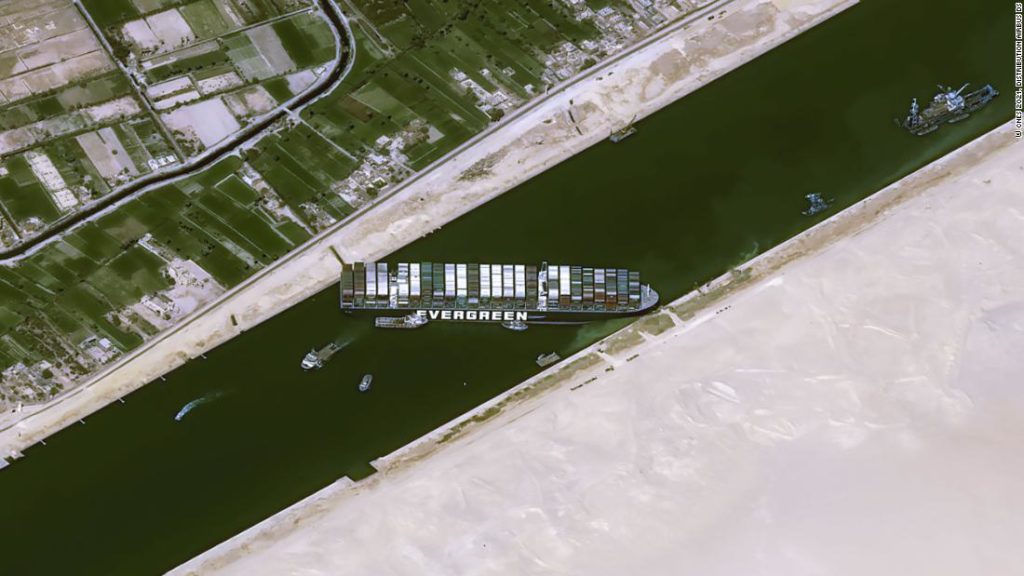The Ever Given, a container ship almost as long as the Empire State Building is tall, ran aground in the Egyptian canal after being caught in 40-knot winds and a sandstorm that caused low visibility and poor navigation.
It has blocked one of the world’s busiest waterways, prompting frantic salvage efforts including the use of two dredgers, nine tug boats and four diggers on the canal bank.
Dredgers are hard at work removing sand and mud from the bow of the ship — and they will need to move between 15,000 to 20,000 cubic meters (530,000 to 706,000 cubic feet) of sand in order to reach a depth of 12 to 16 meters (39 to 52 feet), which could allow the ship to float, the SCA said on Thursday. That’s approximately eight times the size of an Olympic swimming pool.
Shipping experts remain concerned about the situation, with a CEO of a salvage company saying that the ship was “stuck rock solid.”
“Fortunately, the ship is in good shape, undamaged, so that is an important basic condition,” Peter Berdowski, CEO of Boskalis, told Dutch television on Thursday.
“But the first impression is also that it is stuck rock solid.”
Boskalis’ sister company Smit Salvage is one of the firms working to free the Ever Given.
“In addition to the dredgers already on site a specialized suction dredger is now with the vessel and will shortly begin work. This dredger can shift 2,000 cubic meters of material every hour,” said Bernhard Schulte Shipmanagement, the technical manager of the Ever Given ship, in a statement.
The SCA added that it had discussed the option of moving the boat, which measures 400 meters (1,312 feet) long and 59 meters (193 feet) wide, by dredging the area around it.
The senior canal pilot at the SCA told CNN Wednesday that re-floating the massive vessel is “technically very complicated” and could take days.
A team of expert salvors from Dutch Smit Salvage and Japan’s Nippon Salvage, who worked on several high-profile operations in the past, have been appointed to help the Suez Canal Authority re-float the ship, the charter company Evergreen Marine said in a statement.
More than 18,800 ships with a net tonnage of 1.17 billion tonnes passed through the canal during 2020. That’s an average of 51.5 ships per day.
At least 160 ships carrying vital fuel and cargo are now waiting to pass through the blocked waterway, according to a senior canal pilot at the SCA. Some ships are deciding to divert their journey around Cape Horn to avoid the Suez Canal blockage — but they face an extra 3,800 miles and up to 12 days extra sailing time, according to the International Chamber of Shipping.
“Not only will the goods aboard the Ever Given be severely delayed on their journey, but the hundreds of other ships are also affected. The damage done to the global supply chain will be significant,” said ICS Secretary General Guy Platten.
Experts worry that if the ship isn’t freed soon, the logjam could impact the oil market, shipping and container rates, leading to a rise in the cost of everyday goods.
“The majority of trade between Asia and Europe still relies on the Suez Canal, and given that vital goods including vital medical equipment and PPE, are moving via these ships we call on the Egyptian authorities do all they can to reopen the canal as soon as possible,” said Platten.
But the closure now may have a much larger, more disruptive impact than during the last two shutdowns because the level of trade between Europe and Asia has grown substantially in the decades since.
“The size of shipping has become so big that it’s very hard for the Egyptian authorities to, basically, keep up with the growth,” said CNN’s senior international correspondent, Bill Wedeman, on Thursday. “The size of the Suez Canal in the last 50 years, the width of it, has basically doubled and clearly it’s still not big enough.”
The Ever Given is owned by Japanese shipping company Shoei Kisen KK. In a press release, Shoei Kisen apologized to other vessels which were planning to sail and are now stuck. The company told CNN they assume damages will be claimed for the incident, but their main focus now is on refloating the ship.
CNN’s Hamdi Alkhshali and Mostafa Salem contributed to this report.
You may also like
-
Afghanistan: Civilian casualties hit record high amid US withdrawal, UN says
-
How Taiwan is trying to defend against a cyber ‘World War III’
-
Pandemic travel news this week: Quarantine escapes and airplane disguises
-
Why would anyone trust Brexit Britain again?
-
Black fungus: A second crisis is killing survivors of India’s worst Covid wave

